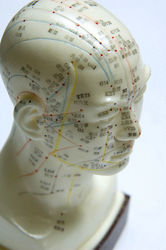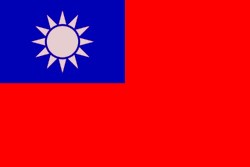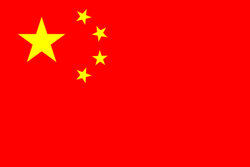Introduction
I offer acupuncture for headaches and migraine, and in this short article, I shall discuss the treatment. Although I will refer below just to headaches, references should be taken to include migraines. More than ten million people in the UK experience regular headaches, and the condition accounts for 1 in 25 GP consultations.

In 2012, the National Institute for Health and Care Excellence (NICE) issued advice (updated 2025)to doctors on the treatment of headaches. For tension headaches, acupuncture is recommended as the treatment of choice. For migraine, acupuncture is also suggested where the usual drugs are either ineffective or unsuitable. The prestigious Cochrane Collaboration has also supported the use of acupuncture to treat tension headaches. For migraine, Cochrane says acupuncture compares favourably with drug treatment, citing fewer adverse effects and greater likelihood of responding.
A large review funded by the National Institute for Health & Care Research in 2017, concluded that acupuncture is better than usual care for pain from chronic headaches.
You can also read in the prestigious journal Neurology Today, an account of how two American neurology professors make use of acupuncture to treat headaches. One says, “I can tell you that it’s not controversial within our neurology department. Everybody embraces it and has been able to see the value in it.”
Treating Headaches
Headaches in my experience are generally very responsive to acupuncture, and I always find them interesting complaints to treat. I begin by finding out from you all about the nature of your headaches. Often they will have been going on for a while, and you’ll be readily able to answer questions about their characteristics. You may or may not have a diagnosis from your doctor, but one of my jobs is to formulate a Chinese medical diagnosis. I will ask you about the location of the pain (eg forehead, temples, back), its nature (eg dull, heavy, throbbing), any accompanying symptoms (eg nausea, visual disturbance), any trigger factors (eg stress, weather, tiredness, tight shoulders), and timing (eg time of day, weekdays, weekends, premenstrually, even a seasonal surge).
We will cover any medication you have tried and any other treatment to date. We will examine your health and wellbeing in a wider sense, to see whether there is anything else which I might connect with your headaches. A suggestion for example, has emerged from research by the University of Maryland, that there may be an association between prescription drugs used to reduce stomach acid eg omeprazole, and an increased chance of migraines.
I will usually offer treatment weekly for a set period, or twice per week initially if your headaches are particularly severe and frequent. I might ask you to keep a simple headache diary so that as the weeks go by, we can measure your progress. There will usually be some lifestyle recommendations to help you as well.
Please do call me to discuss your situation or to arrange an appointment. Below you can read the results of some of the research which has been undertaken into acupuncture for headaches and migraine. The trials vary in quality, but systematic reviews and randomised controlled trials are generally considered to provide the highest quality evidence. If you would like to read more about evidence quality, I would refer you to the British Acupuncture Council’s description of the evidence pyramid.

 Numerous studies, including five meta-analyses, have linked migraine, particularly migraine with aura, with increased risk of ischaemic stroke. The relative risk of ischaemic stroke is doubled in people with migraine with aura compared with migraine-free individuals. (1)
Numerous studies, including five meta-analyses, have linked migraine, particularly migraine with aura, with increased risk of ischaemic stroke. The relative risk of ischaemic stroke is doubled in people with migraine with aura compared with migraine-free individuals. (1) Research lead by Hannover Medical school in Germany has shown that acupuncture, either alone or combined with physiotherapy exercise, is associated with positive effects on symptom intensity, quality of life, anxiety and depression, in patients with tension headaches. They randomised 96 adults, mean age 39, with frequent episodic or chronic tension headaches, to one of four treatment groups: acupuncture, physiotherapy, both of the foregoing, or usual care. Patients were recruited via pain clinics, primary care and regional media. Treatment was given for six weeks. No severe adverse events occurred.
Research lead by Hannover Medical school in Germany has shown that acupuncture, either alone or combined with physiotherapy exercise, is associated with positive effects on symptom intensity, quality of life, anxiety and depression, in patients with tension headaches. They randomised 96 adults, mean age 39, with frequent episodic or chronic tension headaches, to one of four treatment groups: acupuncture, physiotherapy, both of the foregoing, or usual care. Patients were recruited via pain clinics, primary care and regional media. Treatment was given for six weeks. No severe adverse events occurred.  Chinese researchers studying whether acupuncture helps migraine, have performed a meta-analysis of trials, to compare acupuncture with both botox and topiramate. They looked at 15 randomised controlled trials covering 2545 patients.
Chinese researchers studying whether acupuncture helps migraine, have performed a meta-analysis of trials, to compare acupuncture with both botox and topiramate. They looked at 15 randomised controlled trials covering 2545 patients.